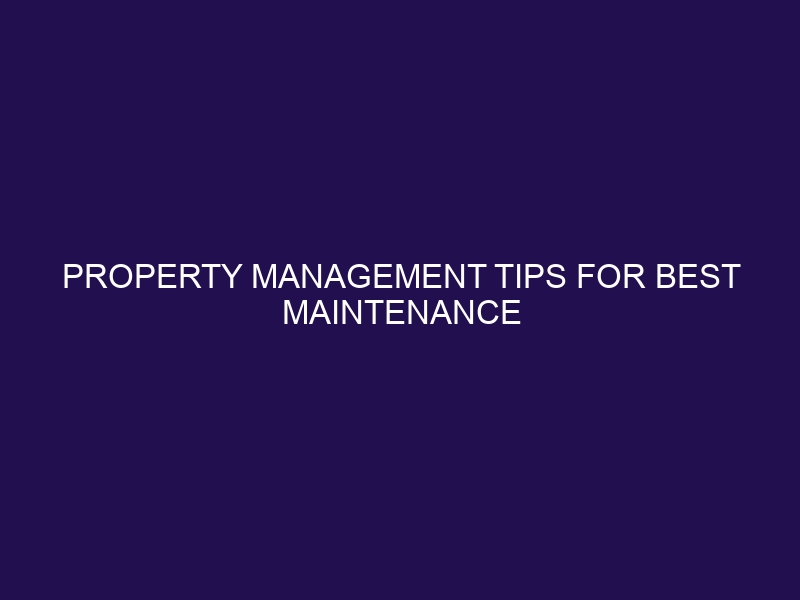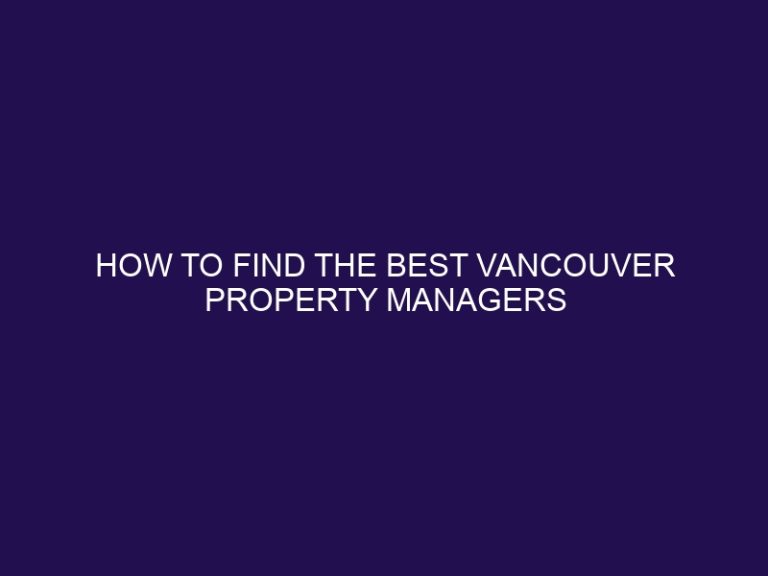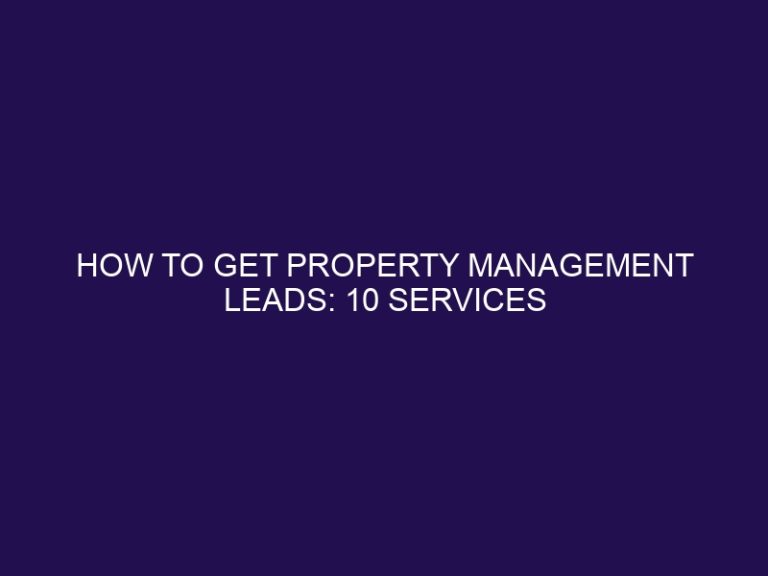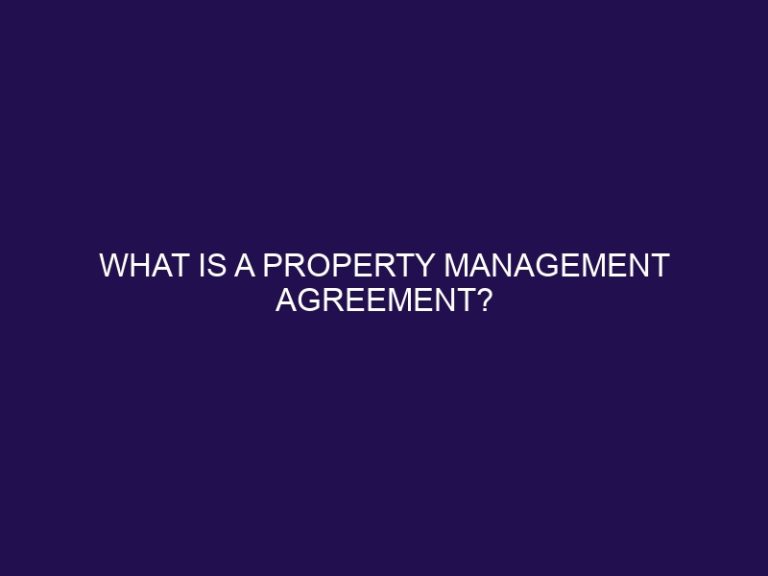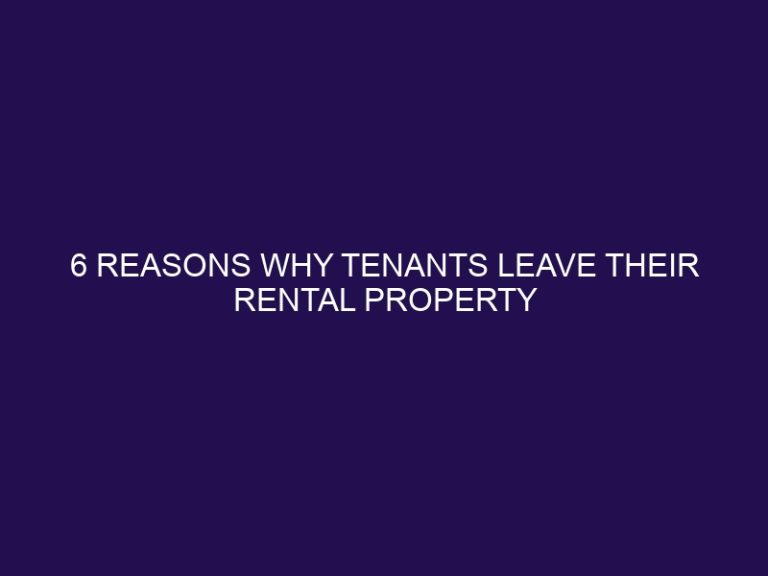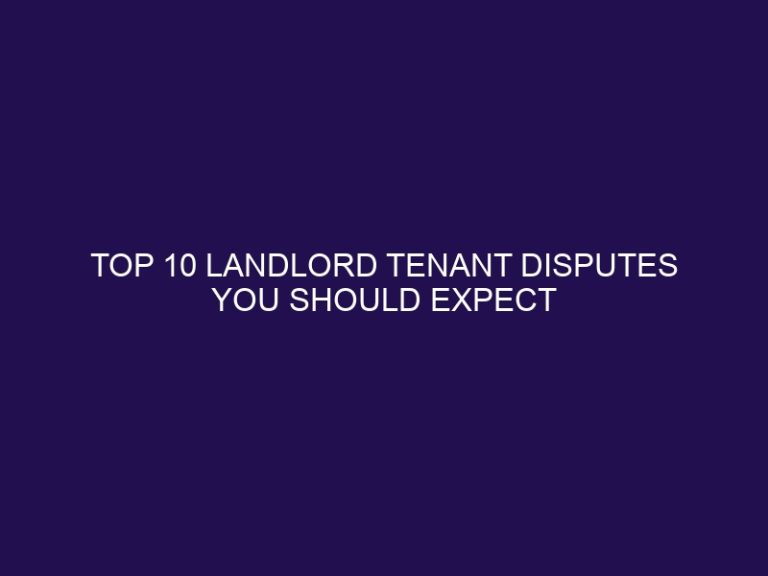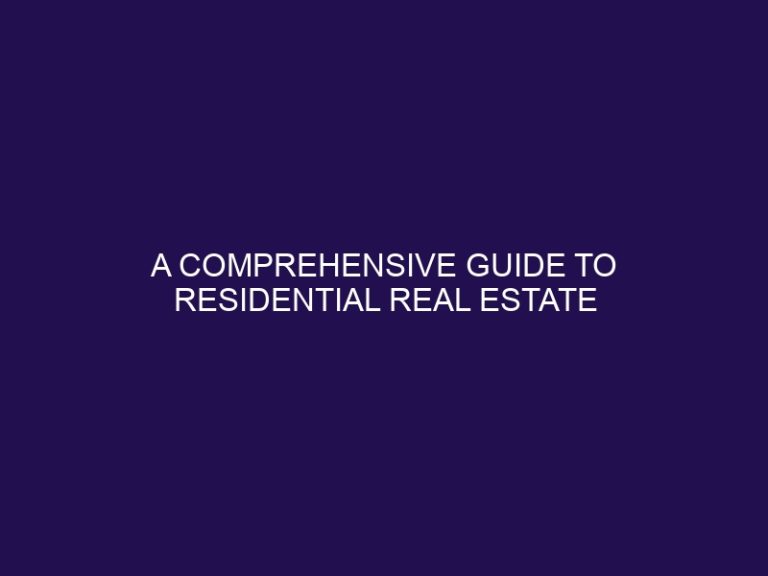Property Management Tips for Best Maintenance Practices
Property management involves the maintenance and upkeep of properties to ensure their optimal condition and value. Implementing best maintenance practices is vital for property managers to effectively manage properties and promote growth. This article will delve into the importance of maintenance in property management, provide tips for best maintenance practices, discuss how maintenance contributes to growth in property management, and offer advice for overcoming maintenance challenges. By following these guidelines and putting a strong emphasis on property maintenance, property managers can enhance tenant satisfaction, increase property value, reduce vacancy rates, and ensure successful property management for long-term growth and success.
Why is Maintenance Important in Property Management?
Maintenance is crucial in property management as it ensures the longevity, value, and functionality of the property. Regular maintenance helps prevent costly repairs and replacements in the long run. It also ensures the safety and satisfaction of tenants, attracting and retaining them. Adequate maintenance enhances a property’s aesthetic appeal, improving its marketability. It complies with legal requirements and regulations, avoiding penalties and legal issues. For example, “Why is Maintenance Important in Property Management?” a property owner neglected to maintain their rental properties, resulting in extensive water damage that displaced several tenants and led to expensive repairs and legal disputes. Proper maintenance could have prevented this unfortunate situation.
Best Maintenance Practices for Property Management
Get ready to discover the best maintenance practices for property management, where attention to detail and proactive strategies are key. In this section, we’ll explore the importance of regular inspections, the benefits of developing and following a preventive maintenance plan, the significance of promptly addressing repairs and maintenance requests, the art of properly managing vendor relationships, and the value of keeping accurate maintenance records. Unleash the power of effective property maintenance and elevate your management game!
Regular Inspections
- Regular inspections play a vital role in property management by guaranteeing the overall property condition and identifying any maintenance issues.
- Here are the essential steps to conducting regular inspections:
- Establish a schedule: Set a consistent schedule for inspections to maintain regularity and consistency.
- Inspect all areas: Thoroughly examine the property’s interior, exterior, common areas, units, and amenities.
- Document findings: Record detailed notes and take photographs of any maintenance issues or potential problems discovered.
- Prioritize repairs: Evaluate the severity of each issue and prioritize repairs based on urgency and their impact on tenant satisfaction.
- Take immediate action: Promptly address any urgent repairs to prevent further damage and ensure the tenants’ safety and comfort.
- Plan for future maintenance: Utilize inspection findings to devise a preventive maintenance plan for regular upkeep. This helps avoid expensive repairs in the future.
Through the implementation of regular inspections, property managers can proactively identify and resolve maintenance issues. This leads to enhanced tenant satisfaction, increased property value, and reduced vacancy rates.
Developing and Following a Preventive Maintenance Plan
To ensure the smooth operation of a property, it is paramount to develop and follow a preventive maintenance plan. This plan serves the purpose of identifying and addressing potential issues before they transform into major problems, thereby saving time and money in the long run. Here are the crucial steps to consider when developing and adhering to a preventive maintenance plan:
Pro-tip: Regular preventive maintenance not only helps prevent costly repairs but also enhances tenant satisfaction and prolongs the lifespan of property assets.
Promptly Addressing Repairs and Maintenance Requests
Promptly addressing repairs and maintenance requests is crucial in property management to ensure tenant satisfaction and protect the property’s value.
- Respond promptly: Promptly addressing repairs and maintenance requests is crucial in property management to ensure tenant satisfaction and protect the property’s value. Acknowledge and address maintenance requests as soon as possible to prevent further damage or inconvenience.
- Effective communication: Promptly addressing repairs and maintenance requests is crucial in property management to ensure tenant satisfaction and protect the property’s value. Maintain open lines of communication with tenants to understand their concerns and keep them informed about the progress of repairs.
- Prioritize emergencies: Promptly addressing repairs and maintenance requests is crucial in property management to ensure tenant satisfaction and protect the property’s value. Address emergencies immediately to ensure the safety and well-being of tenants.
- Efficient coordination: Promptly addressing repairs and maintenance requests is crucial in property management to ensure tenant satisfaction and protect the property’s value. Coordinate with reliable contractors and service providers to schedule repairs quickly and minimize disruptions for tenants.
- Follow-up and feedback: Promptly addressing repairs and maintenance requests is crucial in property management to ensure tenant satisfaction and protect the property’s value. After completing repairs, follow up with tenants to ensure satisfaction and address any remaining concerns.
Properly Managing Vendor Relationships
Effectively maintaining property management requires proper management of vendor relationships. To ensure this, follow these steps:
1. Clearly communicate expectations: It is essential to clearly communicate your requirements for quality, timeliness, and cost to vendors.
2. Thoroughly vet vendors: Conduct comprehensive background checks, review references, and verify that they possess the necessary licenses and insurance.
3. Foster open communication: Regularly engage in communication with vendors to discuss expectations, timelines, and address any issues that may arise.
4. Establish performance metrics: Implement metrics to assess vendor performance, such as response time, completion rate, and customer satisfaction.
5. Periodically evaluate vendor performance: Regularly review vendor performance to identify areas for improvement and address any concerns.
By effectively managing vendor relationships, property managers can ensure smooth and efficient maintenance operations, leading to enhanced tenant satisfaction.
Keeping Accurate Maintenance Records
Keeping accurate maintenance records is crucial in property management for several reasons.
- Legal Compliance: Accurate records help ensure compliance with local, state, and federal regulations regarding property maintenance.
- Preventive Maintenance: By documenting maintenance activities, property managers can track when and how maintenance tasks were performed, enabling them to create comprehensive preventive maintenance plans.
- Budgeting and Planning: Accurate records provide insights into past maintenance expenses, helping property managers forecast future maintenance costs and allocate budgets accordingly.
- Tenant Communication: Detailed maintenance records can be used to communicate with tenants about completed repairs, scheduled maintenance, and any outstanding issues.
- Inspections and Audits: Accurate records facilitate property inspections and audits, allowing property managers to identify areas that require attention and address them promptly.
Keeping accurate maintenance records serves as a valuable historical reference, providing a chronological account of property maintenance activities. They can also be used to demonstrate the property’s maintenance history to potential buyers or investors, helping to build trust and enhance the property’s value.
How Maintenance Contributes to Growth in Property Management
Maintenance plays a crucial role in the growth of property management. By focusing on enhancing tenant satisfaction and retention, increasing the property’s value, reducing vacancy rates, and fostering positive word-of-mouth and referrals, property managers can pave the way for success. This section will dive into the various ways maintenance contributes to the overall prosperity of property management, shedding light on its undeniable impact on the long-term success and profitability of real estate investments.
Enhancing Tenant Satisfaction and Retention
Enhancing Tenant Satisfaction and Retention is a crucial aspect in property management. By placing tenant needs as a priority and creating a positive living experience, property managers can effectively reduce turnover rates and maintain a stable income stream. To achieve this, here are some key strategies to consider:
Pro-tip: Building strong relationships with tenants by providing exceptional customer service can lead to long-term tenant satisfaction and retention.
Increasing the Property’s Value
Effective maintenance practices play a crucial role in increasing the value of a property in property management.
- Regular Maintenance: Implementing regular maintenance routines ensures that the property remains in optimal condition, minimizing the risk of major problems and prolonging the lifespan.
- Upgrades and Renovations: By investing in upgrades and renovations, property managers can enhance the property’s appeal and attract higher-quality tenants, resulting in increased rental rates and property value.
- Curb Appeal: Maintaining the property’s external appearance, including landscaping and exterior features, can significantly impact its market value and attract prospective tenants or buyers.
- Energy Efficiency: Making energy-efficient upgrades, such as installing energy-saving appliances and improving insulation, not only reduces operational costs but also increases the property’s value by appealing to environmentally conscious tenants and complying with energy regulations.
- Market Analysis: Stay informed about market trends and demands to identify opportunities for value-adding improvements, such as adding amenities or upgrading common areas, to stay competitive and increase property value.
A property manager implemented a renovation project, including updating the kitchen and bathroom, replacing flooring, and enhancing the landscaping. These improvements not only attracted higher-quality tenants but also resulted in a significant increase in the property’s appraised value, allowing the owner to secure a more favorable refinancing deal.
Reducing Vacancy Rates
Reducing vacancy rates is crucial for successful property management. Here are some effective strategies to minimize vacant units:
-
Offer competitive rental rates: Conduct market research to determine fair rental prices and adjust accordingly.
-
Enhance curb appeal: Maintain the property’s exterior and landscaping for a good first impression.
-
Improve unit interiors: Upgrading appliances, fixtures, and finishes can attract potential tenants.
-
Provide exceptional customer service: Respond promptly to inquiries, address tenant concerns, and foster positive relationships.
-
Implement effective marketing strategies: Advertise vacancies through various channels, such as online listings and social media.
-
Offer incentives: Consider offering move-in specials or referral bonuses to incentivize potential tenants.
Reducing vacancy rates is of utmost importance in successful property management. Implementing the following effective strategies can help minimize the number of vacant units:
-
Offering competitive rental rates: Make sure to conduct market research to determine fair rental prices and adjust them accordingly.
-
Enhancing curb appeal: Pay close attention to maintaining the property’s exterior and landscaping to create a positive first impression.
-
Improving unit interiors: Consider upgrading appliances, fixtures, and finishes to attract potential tenants.
-
Providing exceptional customer service: Be proactive in responding to inquiries, addressing tenant concerns, and building positive relationships.
-
Implementing effective marketing strategies: Utilize various channels, including online listings and social media, to advertise vacant units.
-
Offering incentives: Think about offering move-in specials or referral bonuses to motivate potential tenants.
Positive Word-of-Mouth and Referrals
Positive word-of-mouth and referrals play a crucial role in the success of property management. Satisfied tenants are more likely to recommend the property to others, which can lead to increased occupancy rates and a strong reputation in the market. Here are some ways to cultivate positive word-of-mouth and referrals:
- Deliver exceptional customer service to tenants, promptly addressing their concerns and providing timely assistance.
- Maintain the property well, ensuring that it is clean, safe, and attractive.
- Create a sense of community by organizing tenant events and fostering a friendly and welcoming environment.
- Encourage tenants to leave reviews and testimonials, both online and offline.
By prioritizing tenant satisfaction and consistently delivering quality service, property managers can harness the power of positive word-of-mouth and referrals, ultimately leading to long-term success.
Tips for Overcoming Maintenance Challenges in Property Management
Overcoming maintenance challenges in property management can be a daunting task, but fear not! In this section, we’ll discover some invaluable tips that will help make your job a breeze. From effective communication and documentation to prioritizing and scheduling maintenance tasks, and even building a reliable network of contractors and service providers, we’ve got you covered. Get ready to tackle those challenges head-on and keep your properties in tip-top shape!
Effective Communication and Documentation
Effective communication and documentation are crucial aspects of property management maintenance.
- Clear communication: Keep tenants informed about maintenance schedules, timelines, and any disruptions. Utilize various communication channels, such as email, text messages, or notices posted in common areas.
- Timely response: Address maintenance requests raised by tenants promptly. Maintain open communication lines and provide regular updates on repair progress or necessary interventions.
- Detailed documentation: Keep accurate records of maintenance activities, including work orders, invoices, inspections, and communication logs. This detailed documentation facilitates monitoring maintenance history, enables efficient follow-up, and fosters accountability.
- Effective reporting: Utilize standardized reporting tools or software to deliver comprehensive reports to property owners or stakeholders. These reports should provide an overview of maintenance activities, expenses, and identify any recurring patterns or issues.
Prioritizing and Scheduling Maintenance Tasks
Prioritizing and Scheduling Maintenance Tasks is essential for efficient property management. Here are some steps to effectively manage maintenance:
-
Identify Urgent Tasks: Prioritize tasks that demand immediate attention, such as emergency repairs or safety hazards.
-
Create a Maintenance Schedule: Develop a schedule to ensure that regular maintenance tasks are performed at appropriate intervals, reducing the risk of major issues.
-
Consider Seasonal Maintenance: Plan and schedule seasonal maintenance tasks, including HVAC system check-ups, gutter cleaning, or pool maintenance.
-
Communicate and Coordinate: Efficiently coordinate with maintenance staff or contractors to ensure tasks are assigned, scheduled, and completed promptly.
-
Utilize Technology: Implement maintenance management software or apps to track and schedule tasks, send notifications, and maintain records.
-
Regularly Evaluate and Adjust: Continuously assess your maintenance processes, adjust priorities as necessary, and learn from previous experiences to improve efficiency.
Building a Reliable Network of Contractors and Service Providers
To build a reliable network of contractors and service providers in property management, consider the following steps:
- Conduct research and carefully evaluate potential contractors and service providers based on their reputation, experience, and expertise in the industry.
- Seek recommendations from other property managers or professionals in the field who have already established reliable networks.
- Thoroughly check their licenses, certifications, insurance, and bonding to ensure compliance and protection.
- Ensure clear expectations and agreements are established regarding the scope of work, timelines, and pricing.
- Promote effective communication and maintain good relationships by providing regular feedback, addressing concerns promptly, and fostering open communication.
Building a reliable network of contractors and service providers is essential for ensuring efficient property maintenance and timely response to repairs and maintenance requests, which ultimately leads to high-quality work.
Utilizing Technology for Streamlined Maintenance Management
By leveraging the power of technology, property managers can greatly enhance maintenance management for their properties, resulting in improved efficiency and productivity. Here are several ways in which technology can be effectively utilized:
- Mobile Apps: Property managers can take advantage of maintenance management apps that enable them to easily track and allocate tasks, receive real-time updates, and seamlessly communicate with their maintenance staff.
- Smart Building Systems: Incorporating cutting-edge sensors and automation systems allows for the monitoring and maintenance of various aspects of the property, including temperature control, energy usage, and security.
- Data Analytics: By utilizing sophisticated data analysis tools, property managers can identify patterns, predict maintenance needs, and optimize scheduling, ultimately leading to proactive maintenance and substantial cost savings.
- Cloud-Based Software: Effectively utilizing cloud-based platforms enables property managers to store and access maintenance records, documentation, and work orders, fostering effortless collaboration and accessibility from any location.
By effectively leveraging technology to streamline maintenance management processes, property managers can significantly enhance operational efficiency, cut costs, and improve tenant satisfaction.
Frequently Asked Questions
What are some common maintenance issues that property managers should address?
Some common maintenance issues that property managers should address include plumbing leaks, HVAC system malfunctions, electrical problems, pest infestations, roofing issues, and appliance failures.
How can proper property maintenance contribute to the success of property management?
Proper property maintenance ensures tenant satisfaction, reduces turnover, attracts quality tenants, preserves the value of the property, and leads to favorable lease renewal rates. It also helps minimize emergency breakdowns, avoid code violations, and save on annual maintenance costs.
What are the four main types of maintenance property managers should focus on?
The four main types of maintenance property managers should focus on are preventive maintenance (regular inspections and scheduled upkeep), corrective maintenance (addressing repair needs promptly), emergency maintenance (handling urgent repairs), and predictive maintenance (using data and technology to anticipate maintenance needs).
How can property managers streamline the maintenance process to improve efficiency?
Property managers can streamline the maintenance process by leveraging technology such as property management software and smart home systems. They can also establish clear communication channels, develop comprehensive maintenance plans, build a network of reliable vendors, and invest in staff training and development.
Why is it important for property managers to stay updated on rental laws and regulations?
Property managers need to stay updated on rental laws and regulations to ensure legal compliance, tenant safety, and to protect the interests of property owner clients. Failure to comply with rental laws can result in legal disputes, penalties, and reputational damage.
How can property management consultants help in improving maintenance practices?
Property management consultants can provide guidance and expertise in setting up efficient maintenance practices. They can help property managers develop comprehensive maintenance plans, optimize processes, identify cost-saving opportunities, and stay updated on industry best practices. Their insights can contribute to overall property management success and the preservation of owners’ valuable investments.

